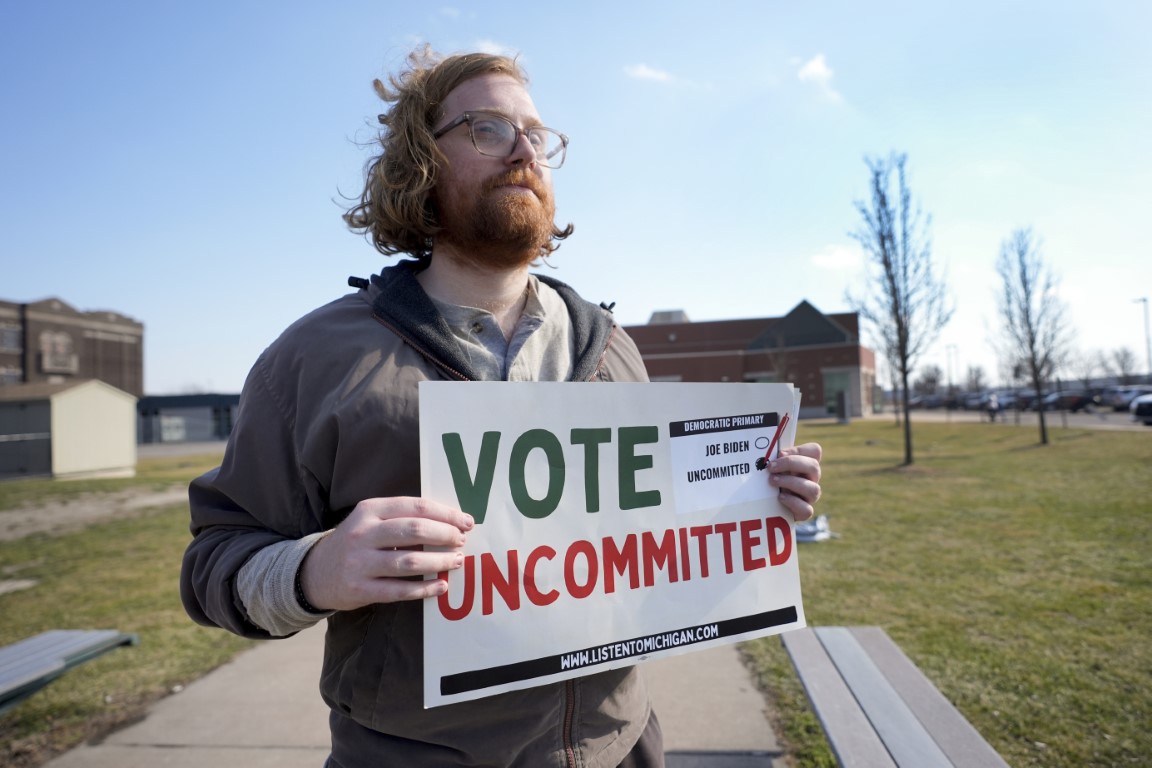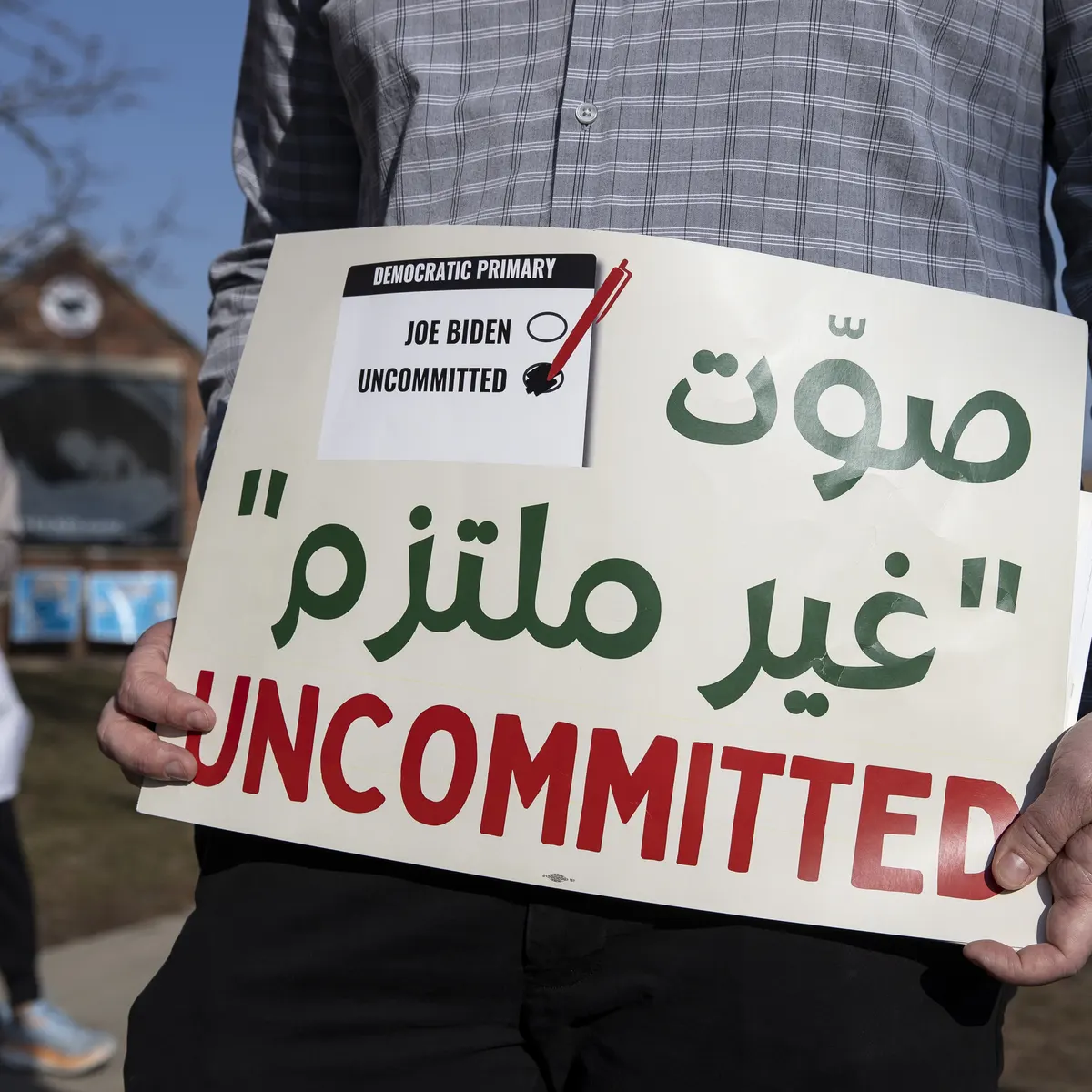How Does Biden Feel Threatened by the ‘Uncommitted’ Campaign?

The Listen to Michigan initiative garnered support from a diverse array of elected officials.
In Michigan, and nationwide, persistent protests have unfolded for months against the Gaza conflict and the U.S. administration’s involvement, with demonstrators taking to the streets, appearing at presidential events, and lobbying representatives for a ceasefire.
Yet, it appeared President Joe Biden remained unresponsive to the rising chorus of Democrats critical of the conflict, and the U.S. media’s coverage of both the demonstrations and the conflict itself seemed to diminish.
Confronted with the need to capture the president’s notice, the growing anti-war faction devised a tactic: urging Democratic electors to select “uncommitted” on their ballots, effectively voting for no candidate, as a demonstration against the Gaza war and a call for peace.
Grassroots Movement
Subsequent primaries revealed the potency of a nimble voter bloc, whose choices come November might determine the election’s outcome and the future of U.S. engagement in Gaza.
Their capacity for rapid, cost-effective voter outreach exemplifies grassroots mobilization and underscores Democratic dissatisfaction with the conflict.
This strategy echoes a 2008 initiative in Michigan. That year, Barack Obama’s supporters, facing his absence on the ballot due to a party rule breach, voted “uncommitted” to counter Hillary Clinton’s campaign, resonating powerfully as approximately 40% of the electorate, notably among Black and young voters, embraced the option.
A late January memo by Waleed Shahid, a Democratic, proposed leveraging “uncommitted” in Michigan’s presidential primary to signal broad disapproval of President Biden’s support for the Israeli Occupation’s aggression on Gaza.
This approach aimed to spotlight the anti-war cause and hone activist skills in outreach and communication, politicizing and channeling war-related discontent.
Michigan’s significant Arab American and Muslim demographics, already active against the conflict and ambivalent or opposed to Biden’s reelection due to Gaza, could draw presidential focus.
As a battleground state claimed by Biden in 2020 and Trump in 2016, its allegiance in 2024 remains uncertain.
The memo’s vision materialized with minimal funding and weeks of intensive local campaigning, informing voters that their ballots could convey to Biden the contingency of their support.
Organizers, aware of individuals inclined to abstain or favor a third party due to anti-war sentiment, saw “uncommitted” as a means to voice their stance ahead of the Biden-Trump showdown, offering Biden an opportunity to respond.
“This was intended not merely as a protest vote but as a caution to President Biden: a substantial number of Americans are unswayed by your reelection bid, and this warrants your attention,” stated Shahid.
The campaign aimed for 10,000 “uncommitted” votes, mirroring Trump’s 2016 victory margin in Michigan, despite the challenges of initiating such a campaign swiftly.
Activists conducted over half a million calls and dispatched upwards of 600,000 texts to voters.
They leveraged established local groups adept at mobilization. Veteran campaigners spearheaded the initiative, supported by a multitude of volunteers from Michigan and beyond, encompassing progressive factions, religious communities, and anti-war entities.
Organizations like the Democratic Socialists of America and Our Revolution aided in canvassing and voter communication, while Jewish activists organized phone banks.

Noticeable Achievements
The Listen to Michigan initiative, a campaign without a committed presidential candidate, garnered support from a diverse array of elected officials, including mayors, state legislators, city council members, and school board representatives. Notably, Rashida Tlaib, a Palestinian American congresswoman from Detroit, along with former congressman Andy Levin, lent their endorsements, amplifying the campaign’s reach.
Surpassing their objectives, over 101,000 Michigan Democrats, representing approximately 13% of the voting populace, opted for the uncommitted option, securing two delegates for the Democratic National Convention.
This surge of support catalyzed an emergent anti-war movement, drawing the president’s focus to the situation in Gaza.
Layla Elabed, an experienced organizer and the campaign’s director, who also shares familial ties with Tlaib, expressed her astonishment at the campaign’s vigor.
“I have never been a part of such an aggressive campaign before and we had such little time to like reach our mountaintop. In less than three weeks, we accomplished the impossible,” she remarked.
The ripple effect of this momentum was palpable. “Michigan birthed a political movement,” Elabed proclaimed.
The movement’s trajectory then shifted from Michigan to other states. The anti-war faction, inspired by Michigan’s triumph, began grassroots efforts to exert pressure on President Biden to agree to a ceasefire.
With guidance and, in some instances, direct assistance from Michigan’s campaigners, they initiated phone and text banking operations, mobilizing volunteers to engage with the electorate.
These groups, spanning multiple states, encompass a diverse coalition of voters, including Muslim and Jewish organizations, political entities, and labor unions.
Minnesota emerged as the subsequent focal point, a state renowned for its progressive ethos, significant Somali community, and adept activists who honed their communication skills amid the racial unrest of 2020 following George Floyd’s death at the hands of a Minneapolis police officer.

Inspiration
Rami al-Kabra, a Washington campaign organizer and Bothell city council member, expressed that Michigan’s campaign served as an inspiration, indicating a potential avenue for those dissatisfied with the president’s actions to express their disapproval.
The Washington campaign garnered support from prominent unions and political figures, uniting the state’s progressive electorate to advocate for uncommitted candidates.
Al-Kabra recounted instances of voters discarding their ballots, feeling devoid of options, only to request new ones upon discovering the uncommitted alternative.
Efforts in Minnesota, Washington, and Wisconsin benefited from Michigan’s organizational aid. The expansion to additional states was not initially anticipated by Shahid, acknowledging the complexity of rapid mobilization.
Nevertheless, the growing momentum affirmed the message’s resonance with voters across the nation, who sought a ceasefire and intended to communicate this demand to President Biden through their ballots.
Inspired by Michigan’s initiative, other campaigns emerged, leveraging local networks and established organizations to form alliances of individuals opposed to the war and determined to use their votes as a declaration of their stance.
Despite smaller campaigns, Super Tuesday states like North Carolina, Colorado, and Massachusetts witnessed substantial participation for uncommitted voters, albeit falling short of the percentages seen in previous comparable years.
Nonetheless, the campaigns attracted local media coverage in these states, maintaining the visibility of the ceasefire vote.
Hawaii’s primary on March 6 reported a higher proportion of uncommitted voters, with about 29% of nearly 1,600 Democratic participants opting for uncommitted, despite limited national organizing support.










